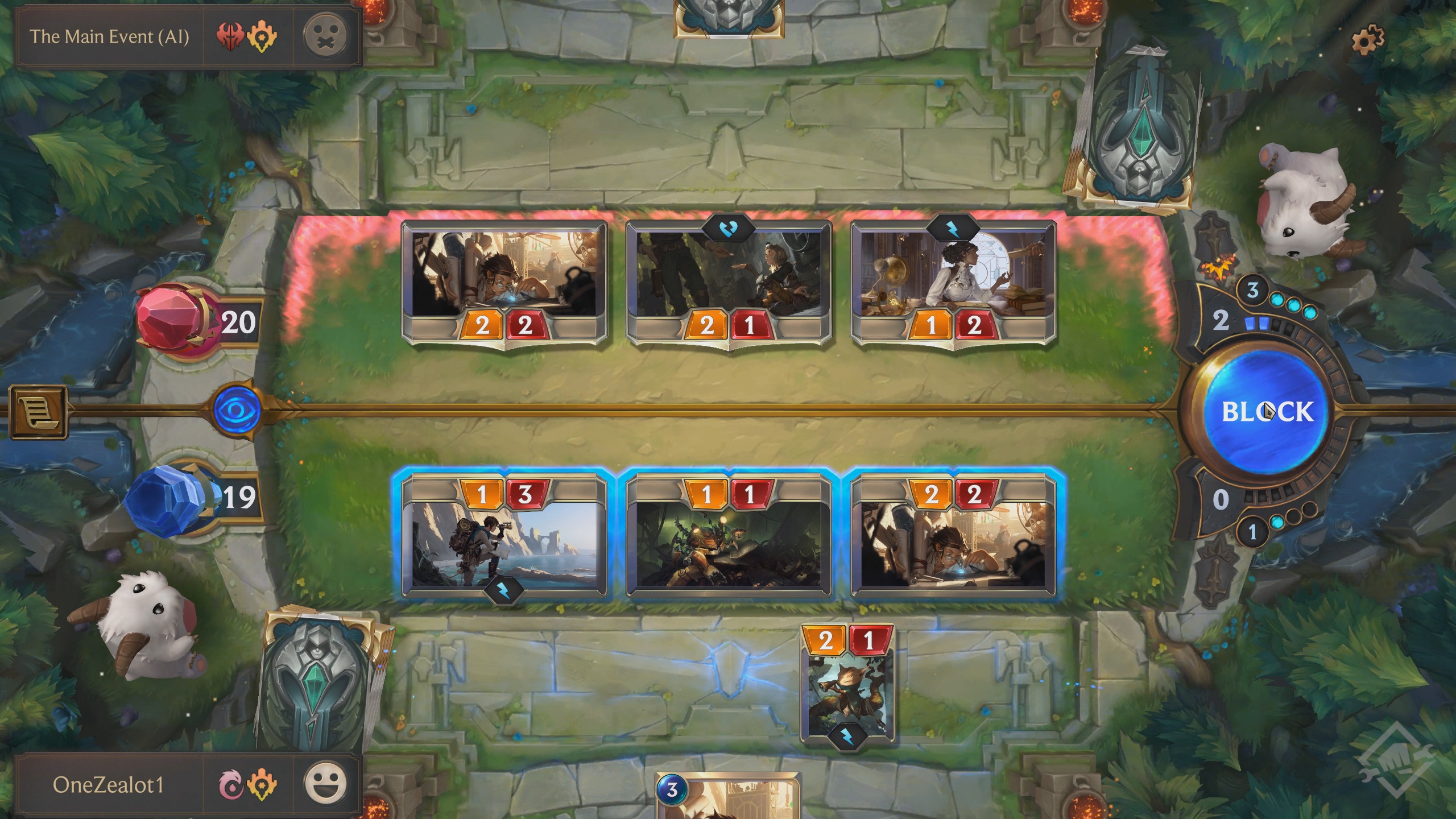
How to Play Legends of Runeterra: A Comprehensive Guide for New Players
Related Articles
- How To Play Subway Surfers: A Comprehensive Guide For Beginners And Experts
- How To Play Brawl Stars: A Beginner’s Guide To 3v3 Mayhem
- How To Play Call Of Duty: Mobile: A Comprehensive Guide For Beginners And Veterans Alike
- How To Play Clash Royale: A Beginner’s Guide To Dominating The Arena
- How To Play The Game FIFA Mobile: A Comprehensive Guide For Beginners And Pros
Introduction
Uncover the latest details about How to Play Legends of Runeterra: A Comprehensive Guide for New Players in this comprehensive guide.
How to Play Legends of Runeterra: A Comprehensive Guide for New Players

Legends of Runeterra (LoR) is a free-to-play digital collectible card game (CCG) set in the vibrant world of Runeterra, the same universe as League of Legends. Developed by Riot Games, LoR blends strategic deckbuilding with engaging gameplay and a unique "Regions" system that offers diverse playstyles and exciting synergies. If you’re looking for a captivating CCG with a low barrier to entry and a rewarding experience, LoR is definitely worth checking out. This comprehensive guide will provide a detailed walkthrough of the game, exploring its core mechanics, key strategies, and helpful tips to get you started on your journey to becoming a Runeterra champion.
Review: A Fresh Take on the CCG Genre
Legends of Runeterra stands out from other CCGs with its unique blend of features:
- Region System: LoR’s core gameplay revolves around its "Regions" system. Each region has its own unique set of champions, spells, and mechanics, offering a diverse range of playstyles. You can combine two regions to create unique deck archetypes, leading to a vast and exciting meta.
- Free-to-Play Model: LoR is completely free-to-play, with a generous card acquisition system. You can earn cards through regular gameplay, events, and the "Vault" system, which rewards you with chests and shards for playing. This makes LoR incredibly accessible for new players.
- Fast-Paced Gameplay: LoR’s matches are typically shorter than other CCGs, making it perfect for casual play and quick sessions. The game encourages aggressive play and strategic decision-making, leading to exciting and unpredictable matches.
- Visually Stunning: LoR boasts stunning visuals and animations, showcasing the beauty of the Runeterra universe. The game’s art style is vibrant and captivating, adding to the overall immersive experience.
Walkthrough: Mastering the Basics

1. Understanding the Core Mechanics:
- Regions: As mentioned earlier, Regions are the core of LoR’s gameplay. Each region has unique champion abilities, spells, and keywords. For example, Noxus champions are known for their aggressive playstyle, while Ionia champions focus on spellcasting and card manipulation.
- Cards: LoR features various types of cards: Champions, Followers, Spells, and Landmarks.
- Champions: Powerful units with unique abilities and level-up conditions.
- Followers: Units that contribute to your board presence.
- Spells: One-time use cards that can affect the board or your opponent.
- Landmarks: Permanent structures that provide ongoing benefits.
- Mana: Mana is used to summon units, cast spells, and activate abilities. You gain Mana each turn, starting with one and increasing with each subsequent turn.
- Attack: Attack is a fundamental action in LoR. You can attack with your champions and followers to damage your opponent’s Nexus (health).
- Blocking: You can block attacks with your own units. Each unit can only block once per turn.
- Nexus: Your Nexus is your health pool. When your Nexus reaches zero, you lose the game.
2. Building Your First Deck:
- Choose Your Regions: Start by choosing two regions that appeal to you. Consider the playstyles and champions you like. For example, if you prefer aggressive play, you might choose Noxus and Demacia.
- Basic Deck Construction: Your deck should consist of 40 cards, including at least 3 champions from your chosen regions.
- Deck Balance: A well-balanced deck should have a good mix of units, spells, and champions. Consider including cards that can deal with different threats, such as removal spells and blockers.
- Champion Synergies: Look for champions with synergistic abilities. For example, Garen (Demacia) and Darius (Noxus) work well together because Garen’s level-up condition is to attack with a follower, and Darius’s ability can create additional followers.
3. Playing Your First Game:
- Mulligan: Before the game starts, you can choose to discard some cards from your hand and redraw new ones. This is a crucial decision as it can significantly impact your early game strategy.
- Early Game: Focus on developing your board presence and gaining Mana advantage. Use your early units to attack and pressure your opponent.
- Mid Game: This is where the game starts to get interesting. You’ll likely have leveled up one of your champions and have access to more powerful spells and units. Focus on maintaining board control and playing around your opponent’s threats.
- Late Game: The late game is all about finishing the game. Utilize your powerful champions and spells to overwhelm your opponent.
4. Leveling Up Champions:
- Level-Up Conditions: Each champion has a specific level-up condition that must be met to unlock their powerful level-up abilities. These conditions can range from attacking a certain number of times to casting a specific number of spells.
- Level-Up Benefits: Leveling up champions grants them new abilities, often significantly enhancing their power.
- Strategic Leveling: Choose which champions to level up strategically based on your current game plan and the opponent’s deck.
5. Mastering Keywords and Mechanics:
- Keywords: LoR has a variety of keywords that affect how cards interact with each other. Understanding these keywords is crucial for mastering the game. Some common keywords include:
- Overwhelm: Damage that goes through blockers to the Nexus.
- Quick Attack: Units with Quick Attack can attack immediately after being summoned.
- Challenger: Units with Challenger can force an opponent’s unit to block them.
- Elusive: Units with Elusive cannot be blocked by followers.
- Mechanics: LoR also features unique mechanics that add depth and strategy to the game. Some notable mechanics include:
- Attack Tokens: Some champions generate Attack Tokens, which can be used to attack or block.
- Ephemeral: Ephemeral units die at the end of the round.
- Fleeting: Fleeting spells are discarded after being played.
- Recall: Recall allows you to return a card from your hand to your deck.
Helpful Tips for New Players:
- Start with the Basics: Before diving into complex strategies, focus on understanding the core mechanics and keywords.
- Experiment with Different Regions: Don’t be afraid to try out different regions and champions to discover your preferred playstyle.
- Play Against AI: Practice against AI opponents to learn the game’s mechanics and develop your deckbuilding skills.
- Watch Streams and Videos: Learn from experienced players by watching streamers and YouTubers.
- Join the Community: Connect with other players on forums and Discord servers to share strategies and ask for advice.
- Focus on Card Acquisition: Utilize the free-to-play systems to acquire cards and build your collection.
- Don’t Be Afraid to Make Mistakes: Mistakes are part of the learning process. Embrace them and learn from them.
FAQ
Q: Is Legends of Runeterra a difficult game to learn?
A: LoR is relatively easy to learn but has a high skill ceiling. The core mechanics are straightforward, but mastering advanced strategies and deckbuilding requires time and effort.
Q: How much does it cost to play Legends of Runeterra?
A: LoR is completely free-to-play. You can earn cards and shards through regular gameplay, events, and the Vault system. However, you can choose to purchase cosmetic items and card bundles if you wish.
Q: What are the best regions for beginners?
A: Demacia and Noxus are good regions for beginners due to their straightforward mechanics and powerful champions. However, you can explore other regions based on your preferred playstyle.
Q: How do I improve my deckbuilding skills?
A: Start by understanding the basic deckbuilding principles. Then, experiment with different card combinations and watch streamers and YouTubers to learn from their strategies.
Q: What are some good resources for learning more about Legends of Runeterra?
A: There are many excellent resources available, including:
- Official Legends of Runeterra Website: https://playruneterra.com/
- Legends of Runeterra Wiki: https://leagueoflegends.fandom.com/wiki/Legends_of_Runeterra_Wiki
- YouTube Channels: Search for "Legends of Runeterra" on YouTube to find tutorials, guides, and gameplay videos.
Conclusion:
Legends of Runeterra is a captivating CCG that offers a rewarding and accessible experience. With its unique Region system, fast-paced gameplay, and generous free-to-play model, LoR is a great choice for both casual and competitive players. This guide has provided a comprehensive walkthrough of the game, covering the core mechanics, key strategies, and helpful tips to get you started. Now, it’s time to dive into the world of Runeterra and become a champion!
Closure
Thank you for reading! Stay with us for more insights on How to Play Legends of Runeterra: A Comprehensive Guide for New Players.
Don’t forget to check back for the latest news and updates on How to Play Legends of Runeterra: A Comprehensive Guide for New Players!
Feel free to share your experience with How to Play Legends of Runeterra: A Comprehensive Guide for New Players in the comment section.
Stay informed with our next updates on How to Play Legends of Runeterra: A Comprehensive Guide for New Players and other exciting topics.




